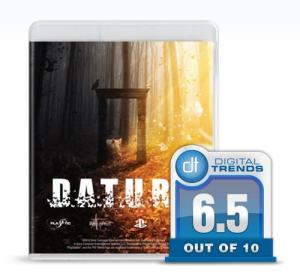 Datura is a game unlike most that you will find on the PlayStation Network, and that is both the game’s primary strength and weakness. For those looking to try something new and break away from the over-saturation of shooters, fighters, traditional sports games and the like, then Datura should definitely be on your radar. It is original and unique for the PSN library in its presentation and story. Unfortunately it is not without its problems. Bunches of them.
Datura is a game unlike most that you will find on the PlayStation Network, and that is both the game’s primary strength and weakness. For those looking to try something new and break away from the over-saturation of shooters, fighters, traditional sports games and the like, then Datura should definitely be on your radar. It is original and unique for the PSN library in its presentation and story. Unfortunately it is not without its problems. Bunches of them.
Those hungry for something new will likely find a lot to enjoy, but the game’s flaws will prevent it from winning over those that may be on the fence and need to be won over. You have to want to like Datura to enjoy the game, which means overlooking certain thing that many won’t.
Datura is, by traditional standards, a weird game. It begins with you in the back of an ambulance, with no hint of what is going on. Suddenly you find yourself in a beautiful limbo-like forest, with odd landmarks, a handful of structures, and no guide. As you make your way through the forest to a suitably melancholy soundtrack, you come across several objects you can interact with for clues. The deeper you go, the more questions you have. It is the mystery that drives you, and the discovery that rewards you.

Perhaps the real standout feature of Datura is the use of Move functionality. The game also supports a six-axis controller, which works well enough for the simplistic set of commands despite being somewhat annoying, but Datura was made for the Move. And yet it feels underutilized.
If this game had been a Move launch title, it would have wowed audiences with its interactive options. Reaching towards the screen and grabbing a crowbar, then swinging your arm to break down boards is great in theory, but its use is limited to scripted events that feel a bit gimmicky and wearisome. Using the Move to break ice with a pickaxe is an interesting idea, but having to swing over a dozen times is just repetitive and irritating.

If you take the time to look around and examine everything—which is not hard as the forest is fairly small—you can easily solve every puzzle. In fact, calling them “puzzles” is a bit of a misnomer, it’s really more about finding things in the correct order then allowing the interaction prompts to show you what to do.
All of this would have been fine if there were more substance to the game, but at just over an hour and a half if you stretch it, Datura is over before it has the chance to really grab you. The premise is intriguing, and the world has a certain sense of wonderment and beauty to it, but it feels half finished. There are choices you make throughout that can be remade on a subsequent playthrough for a slightly different experience, but there just isn’t much. Datura feels empty, and the lack and real gameplay beyond the most fundamental movements isn’t enough to keep you hooked.
 Conclusion
Conclusion
You have to admire the developer, Plastic, for trying something new for the PS3 by bringing back a mostly dormant genre of point-and-click adventure games. There just needs to be more. If this were the demo to a game, it would put that game high on the list of most anticipated. But it’s not. The gameplay is non-existent and fairly muddled, and the hour and a half it takes to fully explore the forest is not enough time to feel any real connection to the world.
Those looking for something fresh and original may want to try out Datura. They will likely find a modicum of enjoyment in the artistic presentation and story, even as it stumbles past.
Score: 6.5 out of 10
(This game was reviewed on the PlayStation 3 on a copy provided by Sony Computer Entertainment)



